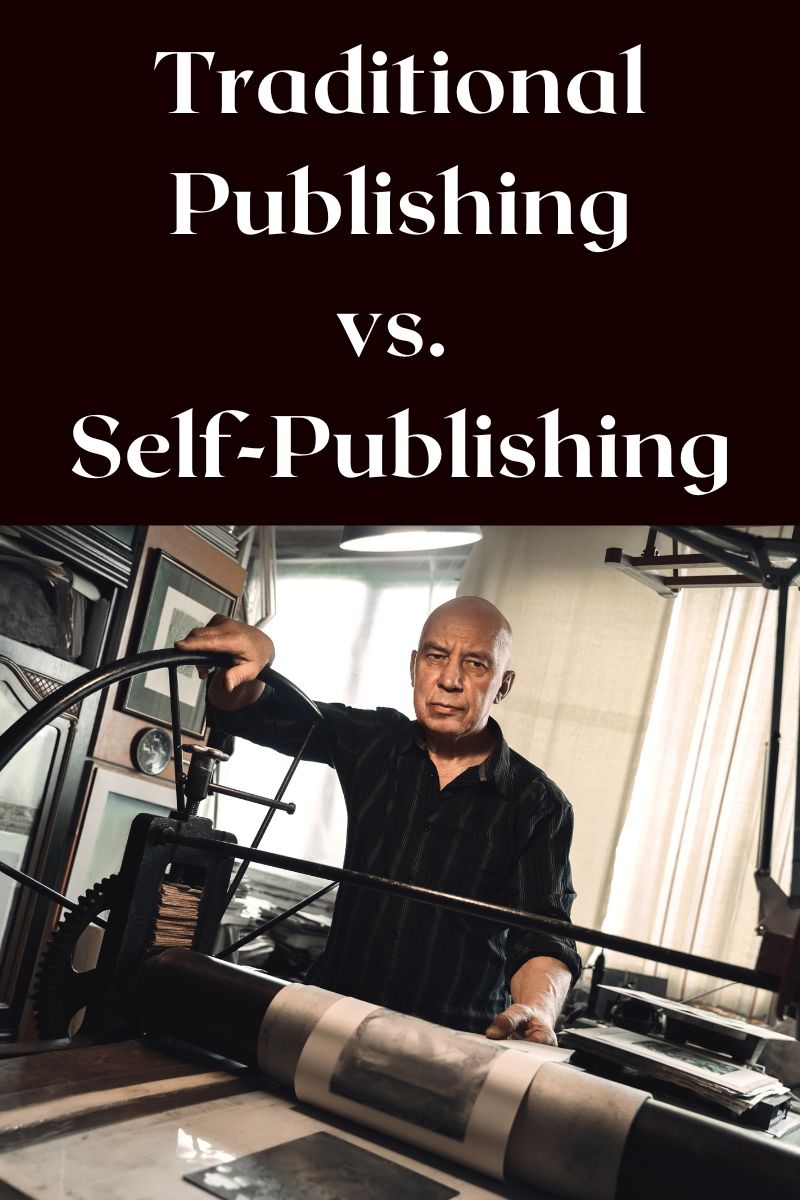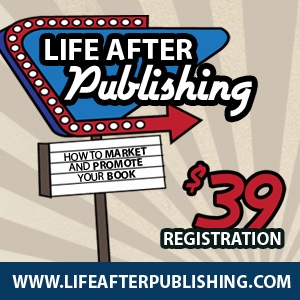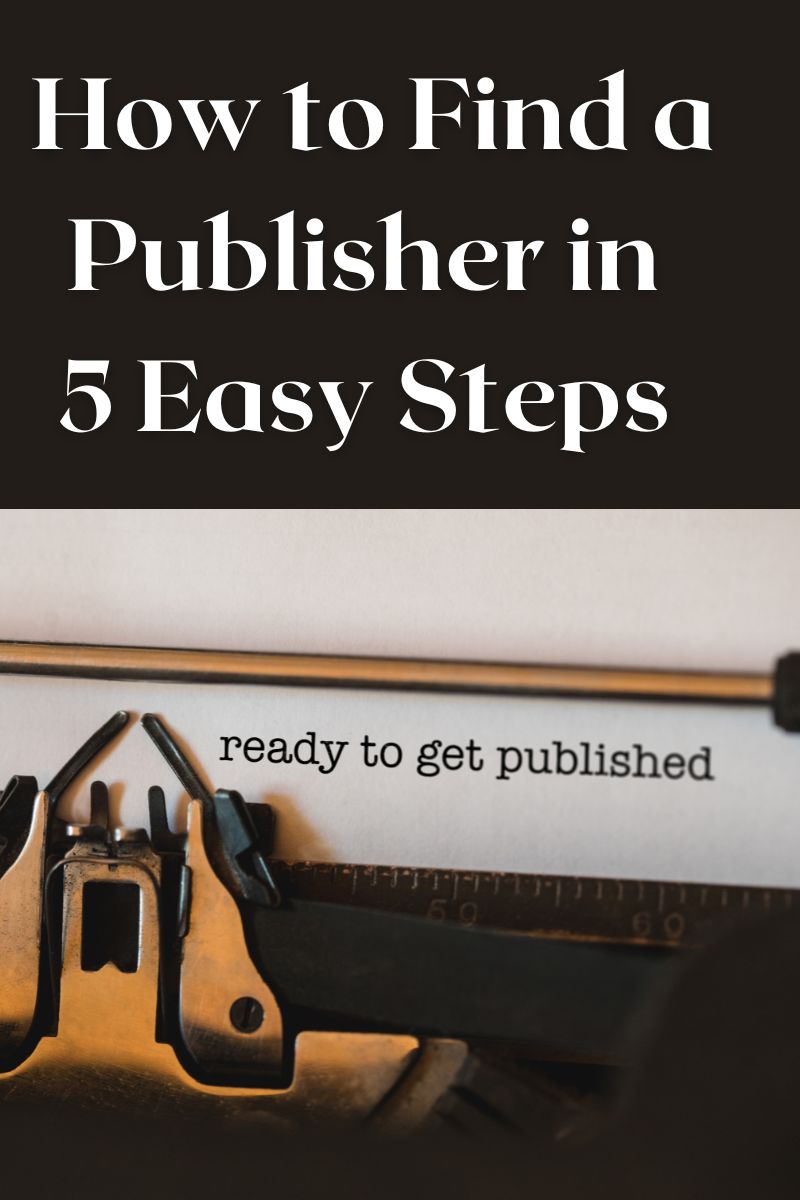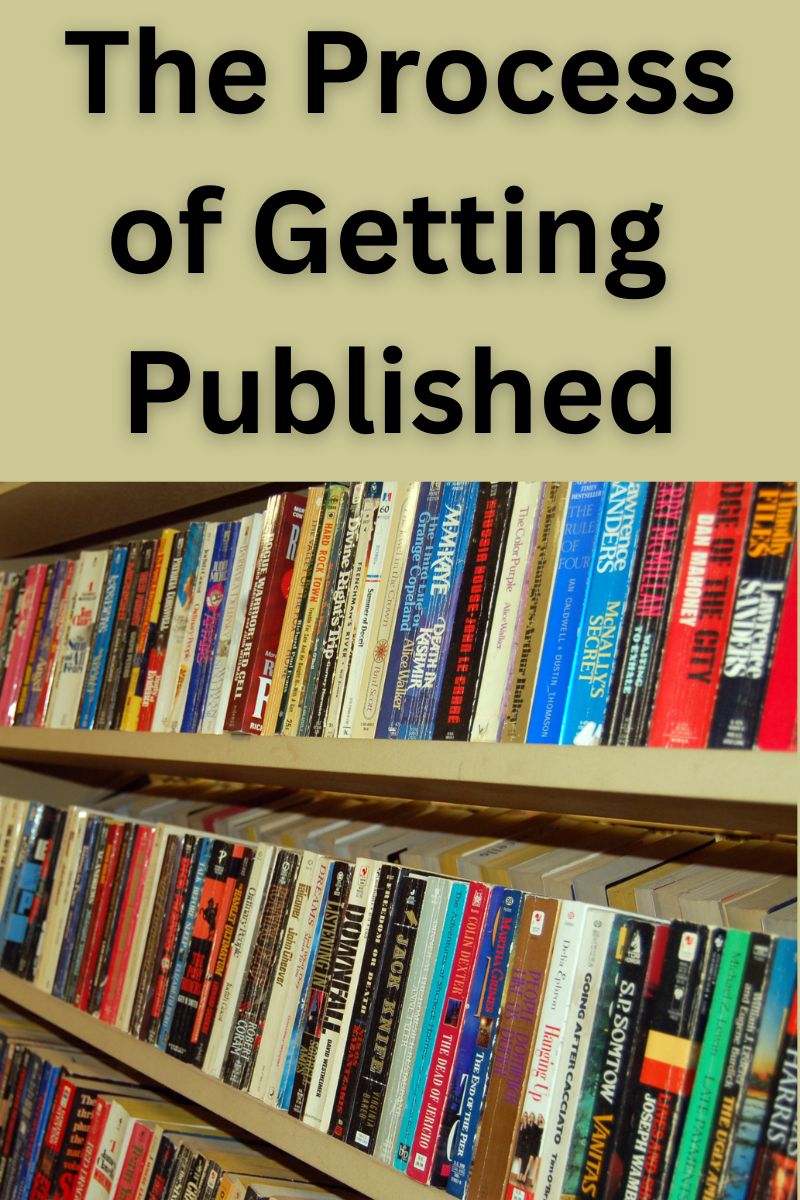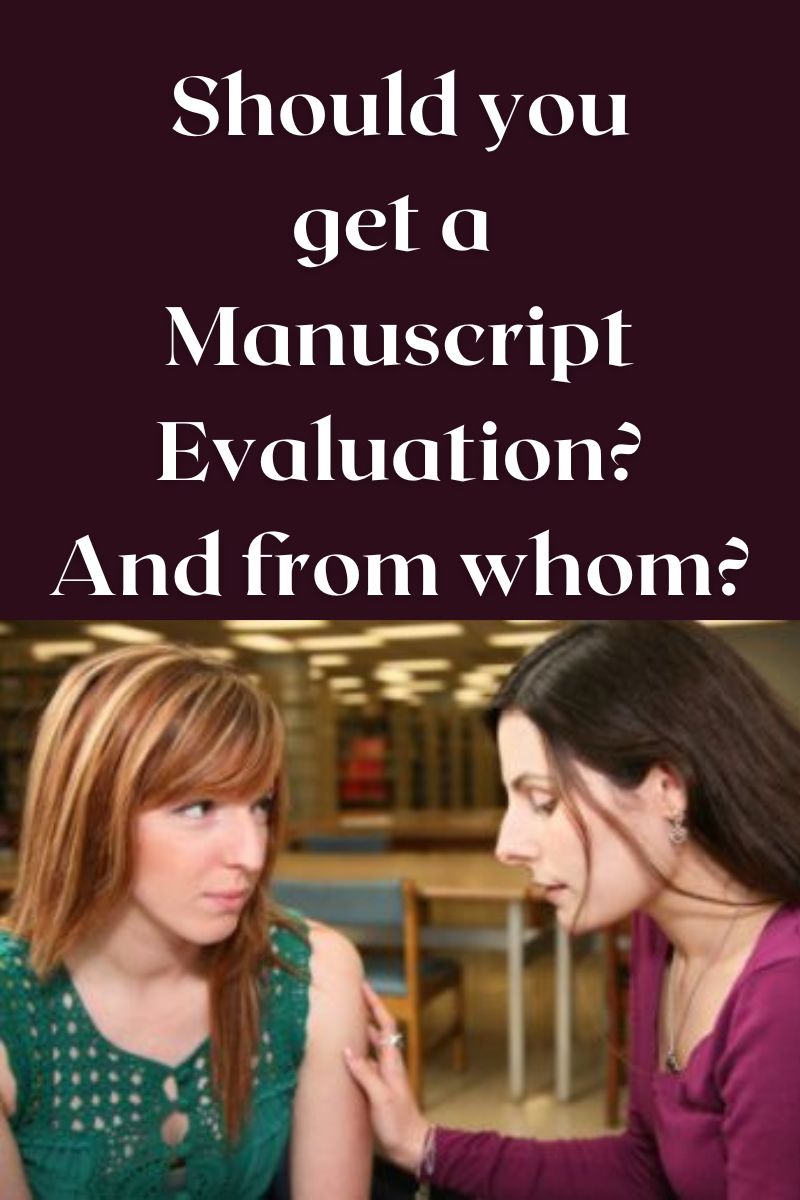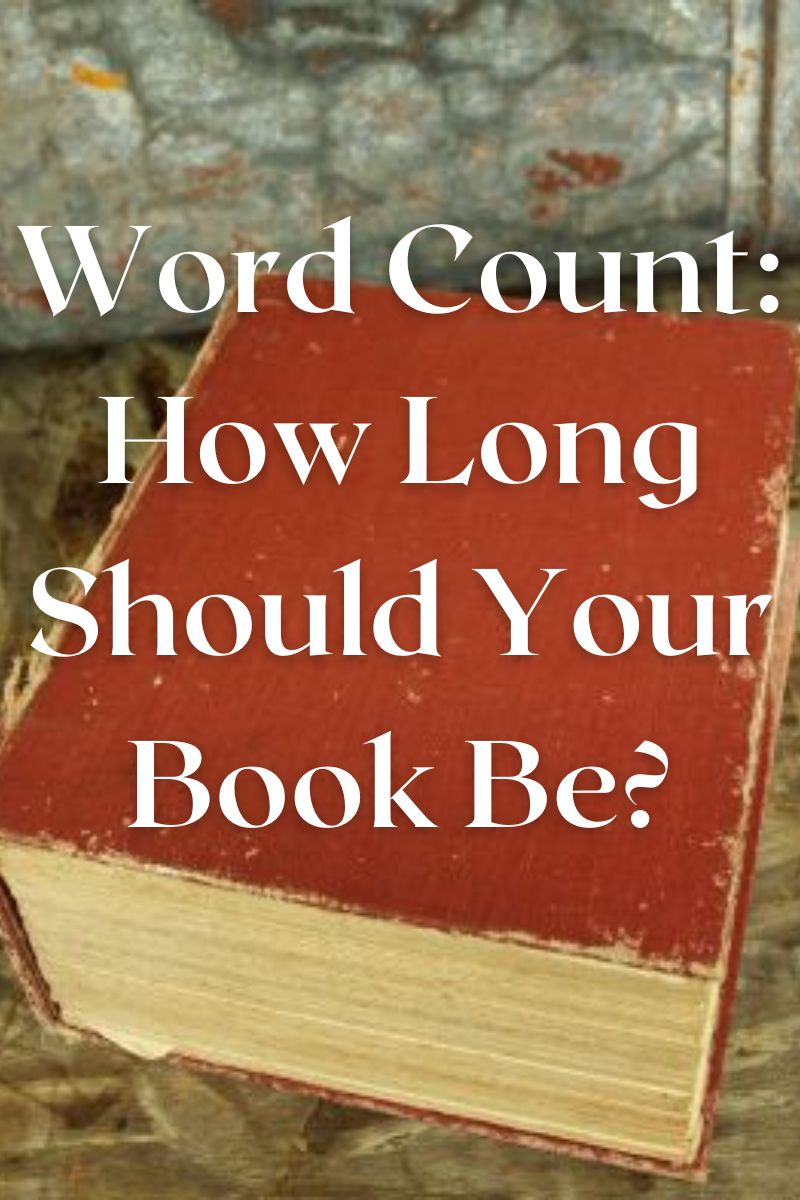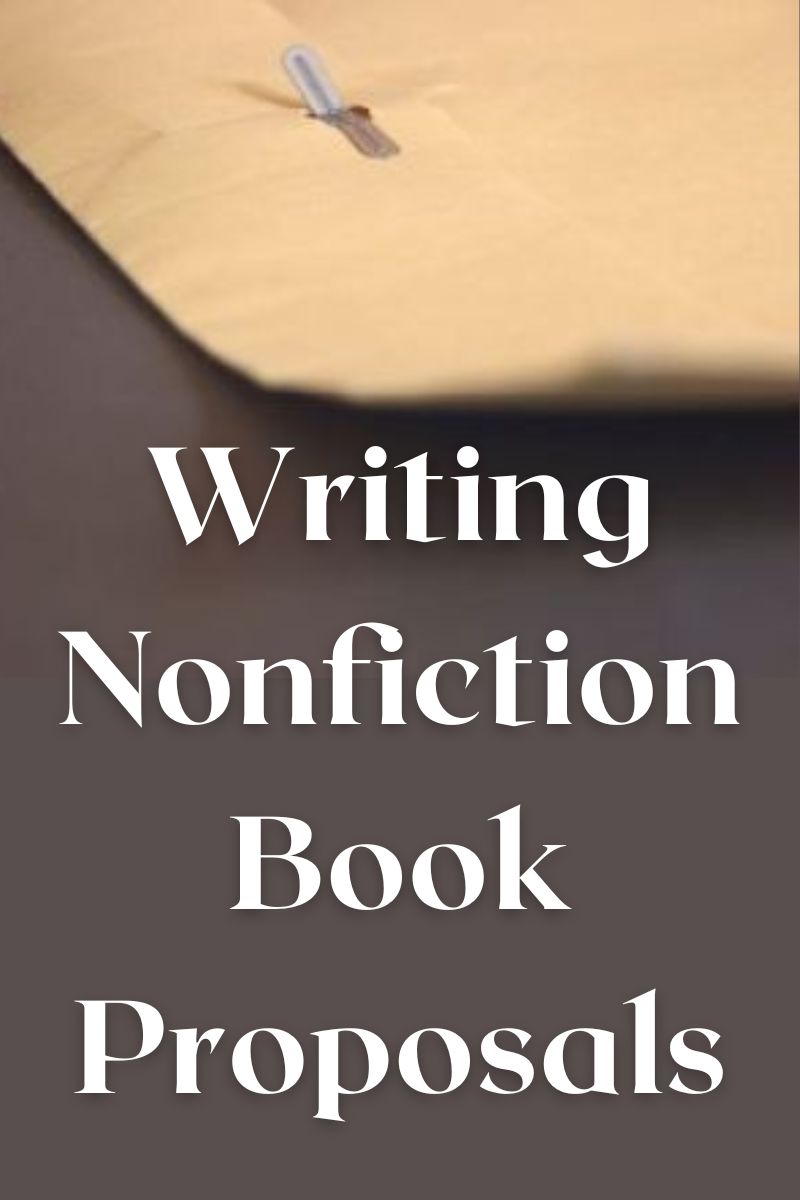Self Publishing vs Traditional Publishing: The Pros and Cons
By Glen C. Strathy
Deciding whether to pursue self publishing vs traditional publishing can make all the difference when it comes to getting your book into the marketplace and being satisfied with the results. Before you make this choice, let's consider some of the pros and cons of getting published in the traditional way.
Disadvantages of Self-Publishing vs Traditional Publishing
1. Getting Paid
Your first consideration when choosing between self publishing vs traditional publishing is whether you are willing and able to pay the upfront costs of self publishing.
When you sell your book to a traditional publisher, the publisher pays you, not the other way round. You get paid a royalty for each copy that is sold. Moreover, you get an advance on those royalties when you sign a contract. Generally, the size of your advance is related to how many copies the publisher thinks it can eventually sell, which is in turn related to the publisher's distribution and how many fans you have. If it is your first book, you are not famous, and you sell to a small publisher, your advance won't be huge. However, at least it means some cash in your pocket, whereas with self publishing, you pay all the costs upfront with no guarantee of making any money at all.
Incidentally, most books do not sell well enough to give you much in the way of royalties beyond your advance. The good news, however, is that the publisher cannot ask you to return part of your advance if your book does not sell as well as expected.
When you self-publish, you must pay all the costs yourself. Maybe the book sales will cover and surpass these costs. Maybe they won't. But most books, even traditionally published books, lose money.
2. Editing & Design
Working with a traditional publisher means your book will benefit from the services of a professional editor, book designer, and proofreader. In the vast majority of cases, these professionals will help you improve the book's content, and make sure the finished product looks better and is free of errors that could undermine your credibility.
If you
self-publish, you can hire an editor, designer, proofreaders, etc.
However, you will have to pay them upfront. This is a disadvantage of self publishing vs traditional publishing.
Many writers who self publish a book try to do these jobs themselves, even if they have no training. Consequently, a lot of self-published books look amateurish and are riddled with errors – features which fail to establish you as a serious writer.
3. Promotion Costs
Whether you choose self publishing vs traditional publishing, you'll want to sell as many copies of your book as possible. Selling a lot of copies requires a promotional campaign that lets potential readers know your book exists.
You probably know that when you self-publish, you will need to conduct all your own promotion. Sadly, the same may be true even if you sell your book to a traditional publisher. Publishers feel obliged to devote the bulk of their marketing dollars to the handful of writers whose books have the best chance of becoming bestsellers -- the authors whose last book sold very well, or who are already famous because of something else they've done. Unless the expectations for your book are exceptional, the publisher will not put a lot of money into promotion, leaving most of it up to you.
That said, there are a number of doors that are closed to self publishers which a traditional publisher can open. Many of the most prestigius awards are only open to traditionally published books. Many of the most widely read reviewers will not touch self published books. Full membership in many writers' associations is only open to traditionally published authors. Writers grants, writer-in-residence programs, etc. often exhibit a similar bias.
4. Distribution
You may ask yourself, “If I have to do my own promotion anyway, why don't I just publish and market my books myself?”
One answer is that a good publisher will provide a distribution system that will put your book into hundreds of bookstores nationwide or even internationally. They may pay to have your book displayed in prominent locations in stores or on online bookstores. They can also do a better job of getting your book bought by libraries or school boards. The bigger the publisher, the better the distribution. Distribution is necessary so that everyone who hears about your book can find it easily, which increases your sales. It also means more people will stumble upon it accidentally in a store and buy it.
Of course, there are some writers who already have a large distribution system of their own. For instance, if you currently make your living performing before large audiences, or you have a business with thousands of customers, or a blog read by thousands of people each day – so that you can reasonably expect to sell thousands of copies of your book on your own – then you might be satisfied with self publishing. Your profit per book may actually be higher if you cut out the publisher as the middle man.
On the other hand, getting published by a regular publisher can expand your distribution beyond the market you could reach on your own, so your profits might be higher using this route. It really depends on just how big a distribution system you have, and how mainstream your book is.
Ironically, if you have your own distribution system, a publisher is more likely to be interested in publishing your book and offer a bigger advance, since the publisher can expect more copies of your book will sell.
5. Credibility
Other disadvantage of self-publishing vs traditional publishing relates to legitimacy and credibility. With traditional publishing, the fact that a professional editor felt your book stood out from the thousands of others stacked in her office as being worthy of being published says something about your skills as a writer. It tells the world that you can write a good book – and not just in your own opinion.
Similarly, the fact that a publisher is willing to take a financial risk publishing your book also says something about the marketability of your ideas.
Self-publishing offers you considerably less prestige. Anyone can self-publish without having to be a good writer, or having expertise, or unique experience, or anything else that would make a book worth reading. What's more, most people know this.
That said, there are a some instances where self publishing can make sense.
Advantages of Self-Publishing vs Traditional Publishing
1. If You Already Have Your Own, Large Distribution System.
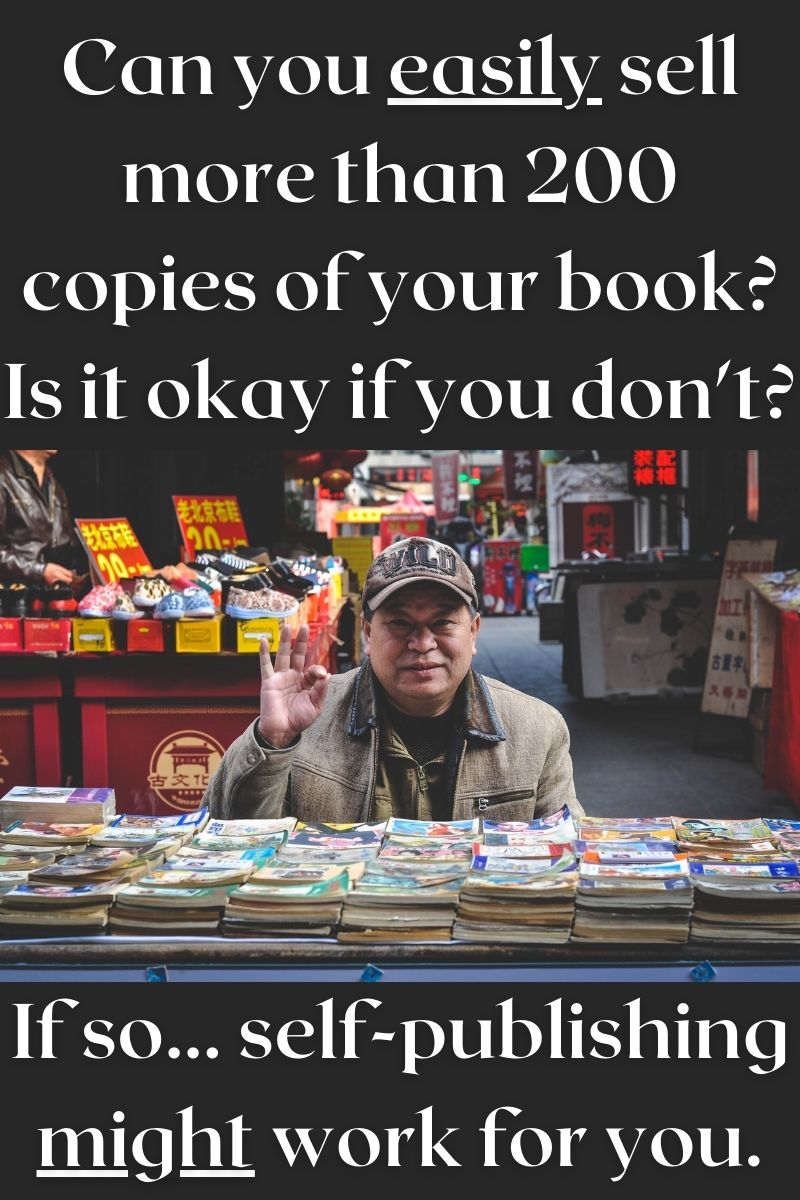 Before you choose self publishing vs traditional publishing, consider if you can definitely sell more than 200 copies of your book to strangers.
Before you choose self publishing vs traditional publishing, consider if you can definitely sell more than 200 copies of your book to strangers.As I mentioned above, some people have their own distribution system. For instance, professional speakers, consultants, or business owners may find it worthwhile to self publish a non-fiction book and sell copies to their customers. Sometimes, giving away a non-fiction book for free can be an effective marketing tool for promoting the author's business.
Some
established authors will self publish some of their books as a way to increase their profits. They can do this successfully if they
already have a large fan base, a way of communicating with this fan base
(e.g. website, newsletter), and a way of selling to them directly
(ecommerce). By self publishing their next book or ebook, established
authors cut out the publisher as the middle-man. Self publishing can also be a way for an author to make some money from books of theirs that have gone out of print.
It may also be that you have access to a niche audience interested in the type of book you are writing – which a mainstream publisher may have trouble targeting. For instance, if you belong to a nationwide organization of chainsaw sculptors, you might be in a better position to sell more copies of your book on chainsaw sculpting than most bookstores ever would.
2. Retaining Creative Control Over Your Book.
A big reason many writers choose self publishing vs traditional publishing is to retain control over every aspect of their book.
Traditional publishers, since they are paying the costs, demand a lot of control over a book – including not just editing the content but choosing the title, writing the jacket copy, commissioning artwork, deciding on the format, etc. Usually they know what they are doing, but not always. There are cases where the author knows best and publishers refuse to listen.
If you are 100% convinced that you know how your book should be designed, edited, and promoted, you may be tempted to publish it yourself. Of course, you may be wrong, especially if you are not a publishing professional yourself. However, if you feel strongly that you are right, self publishing will give you control over all aspects of your book.
If you go this route, just remember that if you want your book to sell, you also need a large distribution system and some skill at marketing.
3. Self-Publishing Might Attract the Attention of Traditional Publishers
Let's
say you tried to sell your book to a number of publishers who all
rejected it. You may think that if you self publish and sell a lot of
copies of your book on your own, traditional publishers will become more
interested in publishing another edition of your book. After all, you
will have convinced them there is a market for it. Certainly some self-published books get picked up by publishers - but usually only if they sell very well, which the vast majority don't.
Of course, the risk is that the publishers who rejected
your book had good reason to, in which case you will go to a
lot of work and expense only to prove them right in the end. But if it's true that you just have not
found the right publisher yet, publishing your book yourself could be an additional
way of getting found - just like you could win the lottery, but the odds are slim.
4. Self Publishing is Quick and Easy
If you thought writing a book was tough, getting your first book published by a
traditional publisher can seem even tougher. It can take years to find a publisher. It demands a lot of patience and offers no guarantee of
success. You may get many rejection letters before you sell your first
book, which can feel like having a series of gorgeous, smart, super-cool people tell you
bluntly that they have no desire to go on a date with you. Even if you're successful, agents and publishers are so swamped with submissions that it can take years of effort to find a publisher.
Of course, you may not really be interested in a career as an author. Maybe you just have one book that may never become a bestseller but means something to you – a book you would be content just sharing with a small readership. If that is the case, self publishing may make sense for you. It's fast, it's easy, and these days it's not even expensive. Print on Demand services can be quite affordable for small runs.
If you're interested in self publishing via Print-on-Demand, you might check out some of the larger companies offering this service, such as Author House, Create Space, or Lulu. Also, for more information on the realities of self publishing, including how to avoid scams, check out Writer Beware.
However, here's something else you should consider when choosing self publishing vs traditional publishing...
Self Publishing vs Traditional Publishing: Why Not Combine Them?
The most legitimate and respected form of self publishing is to set up your own publishing company, with your own imprint. This gets you more credibility and increases your access to reviewers, distribution, awards, and all the other perks traditional publishing offers. If you are serious about having a long-term career as a self-published author, you know your books will sell, and you enjoy the business side of publishing, this is the best route to go.
As with any business, you need expertise to run your own company. However, lots of people do it. And sometimes families do it (for instance, if one spouse is a writer and the other is more of an entrepreneur). You can also hire experts (editors, designers, marketers) and services (ebook creation, printing, print-on-demand) for specific jobs. In time, you might even publish other authors works as well as your own (which adds to your credibility as well as potential profits).
A big advantage of having your own publishing company is that costs are often tax-deductible. Losses in one year can be deducted from profits in a later year. You will need to study the tax laws in your home country or state to see what tax breaks are offered, but such laws exist in most countries.
The other end of the self publishing scale is vanity publishing, which is essentially a scam whereby a printer prints thousands of copies of your book for a fee, but offers you no other support--no distribution, no marketing, no design, no editing, etc. Most of the time, people who pay for vanity publishing end up with thousands of books that sit in their basement and never get sold or read. Vanity publishing is what gave self-publishing a bad reputation.
In between these two extremes is a big grey area called supported self publishing that offers various levels of support and credibility for authors who want to publish their books themselves but confine their activities to writing and promoting.
- Home
- Publishing
- Self-Publishing
